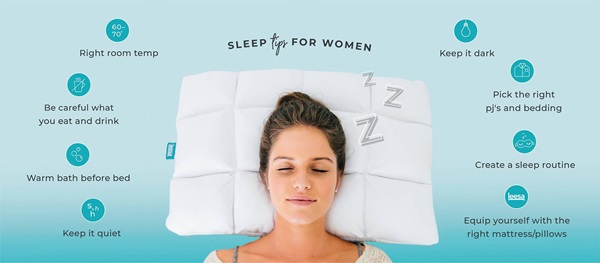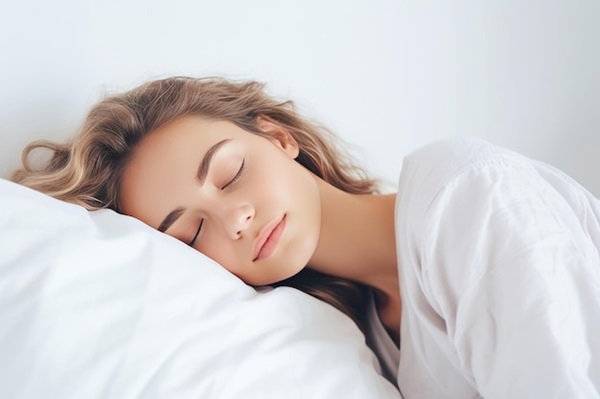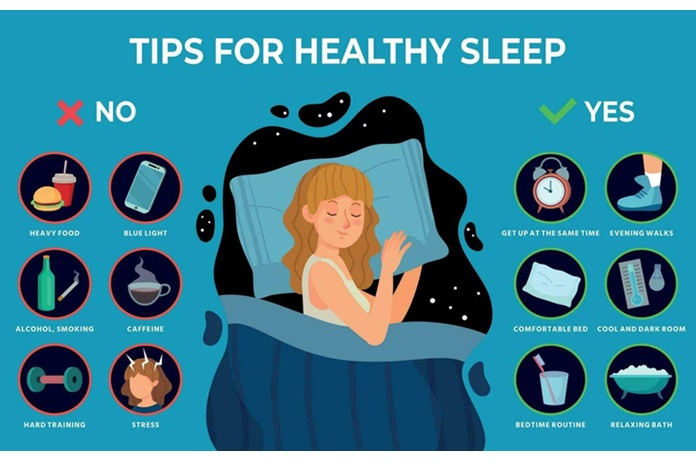Healthy sleep habits are especially important for women as they generally need more sleep than men. Women are also more likely to experience insomnia compared to men, with about 40% higher chances. Even those without insomnia may still struggle with falling or staying asleep and feel more tired during the day. Practicing healthy sleep habits can help women get the sleep they need to stay healthy and alert throughout the day.
Create a Calm and Quiet Sleep Environment
Research has shown that women are particularly sensitive to noise while sleeping. If you often wake up during the night, noise might be the cause. To address this, try using earplugs to block out disruptive sounds.
A white noise machine in your bedroom can also be beneficial, as it provides a soothing background sound that masks other noises and promotes better sleep.

Similarly, you can also try installing blackout curtains or shades to block out light from outside. This can help regulate your body’s internal clock and create a more restful environment.
Moreover, try not to use electronic devices, such as phones, tablets, and computers, before going to bed. The blue light from screens can interfere with your sleep. Likewise, wear comfortable, breathable sleepwear to enhance your comfort throughout the night.
Temperature Control
Cool nighttime temperatures are generally beneficial for sleep. However, they can be especially important for women undergoing hormonal changes, such as before and during menstruation, pregnancy, and menopause.
Women often experience night sweats—intense hot flashes during sleep—during menopause or perimenopause. To mitigate these disruptions, maintaining a cool bedroom can be helpful.

Additionally, wearing lightweight pajamas can further enhance comfort and support a restful night’s sleep. Similarly, layer your bedding so you can adjust your warmth throughout the night. You can use materials like cotton and linen are breathable, while flannel and down offer more warmth.
Take Extra Care During Hormonal Shifts
Hormonal changes can make an impact on sleep in various ways beyond just temperature fluctuations. To improve sleep during these times, it’s important to maintain healthy sleep habits.
Following habits like, consistently going to bed and waking up at the same time each day, practicing relaxation techniques like meditation and deep breathing, using an eye mask, and avoiding late afternoon naps can be beneficial.

Moreover, hot flashes account for only about 27% of nighttime awakenings in women approaching menopause.
Additionally, over 65% of pregnant individuals face sleep issues related to factors such as nausea, pain, acid reflux, and frequent urination, rather than just hot flashes.
Hormonal changes can also cause sleep disturbances in the week before menstruation for those with premenstrual syndrome (PMS) or premenstrual dysphoric disorder (PMDD).
Exercise Regularly
Research has shown that regular exercise can improve sleep for everyone, including women. The study also has proven that more active women tend to sleep better, while those who are sedentary often experience more insomnia.
High-intensity aerobic exercise may be particularly effective in enhancing sleep quality compared to low-intensity workouts. However, it’s best to avoid exercising late in the afternoon or evening, as it can interfere with sleep
For menopausal women, it’s important to monitor how exercise affects their bodies, as some may find that exercise doesn’t alleviate hot flashes and can even raise body temperature.
Doing exercise regularly aids in regulating hormones like estrogen and progesterone, which can impact sleep patterns, especially during menstruation, pregnancy, or menopause.
Moreover, exercise also helps to alleviate the symptoms of depression and anxiety, which can significantly impact sleep. This can be particularly helpful for women who experience mood fluctuations due to hormonal changes.
Stop Consuming Sleep Disruptors
Many people may not realize that a common substance can disrupt their sleep. Things like caffeine, alcohol, and nicotine can all negatively affect sleep quality.
Stop consuming beverages like coffee, tea, soda, and some medications as they contain caffeine that can stay in your system for hours. Especially try to avoid consuming caffeine in the afternoon and evening.
Similarly, smoking or using nicotine products also hamper the ability to fall asleep and reduce overall sleep quality. So if you smoke, consider quitting or reducing your nicotine intake.
To improve sleep, especially for women experiencing menopause-related hot flashes, it’s helpful to avoid these substances in the hours leading up to bedtime.
Consider Your Partner’s Sleep Behaviors
Women may experience disrupted sleep due to their partner’s sleep behaviors, such as snoring or symptoms of obstructive sleep apnea.
Men are more likely to have obstructive sleep apnea, which can cause snoring, gasping, and choking sounds that can disturb a bed partner’s sleep.
If a partner has undiagnosed sleep apnea, their symptoms might interrupt the other’s rest, leading to daytime fatigue.

Since women are generally more sensitive to noise during sleep, a partner’s disruptive sounds can have a significant impact. Addressing and treating sleep apnea in a bed partner may help improve the quality of sleep for both individuals.
Adjust Caregiving Roles to Protect Sleep Time
Research has shown that women usually experience more sleep disruption due to caregiving responsibilities, such as caring for children or sick family members.
This often leads to a heavier share of household labor and increased stress, which can interfere with sleep and reduce opportunities.
To improve sleep, it can be helpful to share caregiving responsibilities more equally with male partners. Ensuring a fair division of duties and emotional support can help protect women’s sleep time.
Setting clear boundaries around sleep can also be crucial, as women generally need more sleep than men, take longer to fall asleep, and wake up more frequently during the night, especially due to noise.
Also read, Explore The Benefits and Considerations of Sleeping Naked
When to See a Medical Professional?
If you’re following healthy sleep habits but still have trouble sleeping, consider consulting a doctor.
Women are at higher risk for disorders related to sleep issues, such as depression, anxiety, fibromyalgia, and restless legs syndrome. Addressing these conditions may help improve sleep.
Women may experience obstructive sleep apnea differently from men, which can lead to less frequent screening for the disorder.
Although obstructive sleep apnea is less common in women throughout most of life, the risk becomes equal during menopause.
If you’re menopausal and still having trouble sleeping despite healthy habits, it may be worth discussing obstructive sleep apnea or other sleep disorders with your doctor.
Conclusion
In conclusion, prioritizing and nurturing healthy sleep habits is essential for women due to their unique physiological and lifestyle factors. Creating a serene and comfortable sleep environment plays a pivotal role in achieving restful sleep. This includes managing bedroom temperature, reducing noise, and maintaining a consistent sleep schedule. Additionally, understanding and adapting to hormonal changes, which can affect sleep patterns, is crucial for improving sleep quality.
Incorporating regular physical activity into your routine can help regulate sleep cycles, but it’s important to avoid vigorous exercise close to bedtime. Steering clear of stimulants like caffeine and electronic screens in the evening also contributes to better sleep. Furthermore, considering your partner’s sleep habits and finding solutions to minimize disruptions can enhance the quality of your rest.
Similarly, balancing multiple responsibilities, such as caregiving or professional duties, often adds to sleep challenges. Addressing these stresses through time management and self-care can mitigate their impact on sleep. Finally, seeking professional medical advice when needed ensures that any underlying health issues affecting sleep are properly addressed.
By focusing on these comprehensive strategies, women can significantly improve their sleep patterns, reduce daytime drowsiness, and enhance overall well-being. Taking proactive steps to address these various factors not only fosters better sleep but also supports a healthier and more balanced lifestyle.
Frequently Ask Question
Why is prioritizing sleep habits especially important for women?
Women have unique physiological and lifestyle factors that can impact sleep quality. Addressing these specific needs can help improve sleep patterns and overall well-being.
How can I create a better sleep environment?
To enhance your sleep environment, focus on managing bedroom temperature, reducing noise, and maintaining a consistent sleep schedule. Make sure your bedroom is conducive to relaxation and restfulness.
How do hormonal changes affect sleep, and what can I do about them?
Hormonal fluctuations can influence sleep patterns. Understanding these changes and adapting your sleep routine accordingly can help manage their effects. Consider consulting a healthcare professional for personalized advice.
What role does exercise play in improving sleep quality?
Regular physical activity helps regulate sleep cycles, but avoid vigorous exercise close to bedtime as it might interfere with falling asleep. Aim for regular, moderate exercise earlier in the day.
How can I minimize sleep disruptors?
To minimize sleep disruptors, avoid stimulants like caffeine and electronic screens in the evening. Establish a calming pre-sleep routine to prepare your body for rest.
What if my partner’s sleep habits affect my sleep?
If your partner’s sleep habits disrupt your rest, consider finding solutions to minimize these disruptions. Open communication and possibly adjusting sleep arrangements can help improve sleep quality.
How can balancing caregiving and professional responsibilities impact my sleep?
Managing multiple responsibilities can add stress and impact sleep quality. Implementing effective time management strategies and prioritizing self-care can help mitigate these effects.
When should I seek medical advice for sleep issues?
If you experience persistent sleep problems or suspect an underlying health issue, seek professional medical advice. A healthcare provider can help diagnose and address any conditions affecting your sleep.
What are some overall strategies to improve sleep patterns?
Focus on creating a comfortable sleep environment, maintaining a consistent sleep schedule, managing stress, and addressing lifestyle factors such as exercise and diet. Comprehensive attention to these aspects can lead to better sleep quality.
You may also like to read, The Only Nighttime Skincare Routine You Need To Manage Oily Skin
